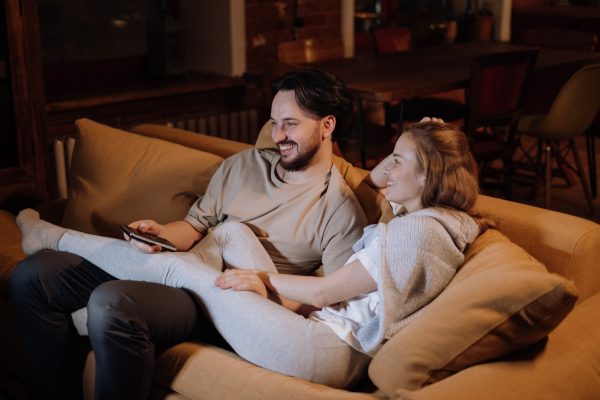Whether you think the term applies to you or your partner, understanding exactly what it means to be emotionally unavailable can give your love life a new perspective.
You’re probably familiar with the term “emotionally unavailable” – either thanks to someone you dated and made sure to … feel it, or it’s something that’s happening to you and affecting your interpersonal relationships. However, this term is used more often than it should be, or at least without considering its true meaning.
What emotionally unavailable means
According to the experts, “emotional unavailability” is a phrase that describes the state of not being in touch with your own feelings and/or willing to show them to someone else. It’s like there’s a wall between you and other people that prevents feelings from being said and expressed.
Because of its overgeneralized use, the term itself may have led you at some point in your life to reject someone who declared themselves “emotionally unavailable” without really understanding what it means, where it comes from, and how deeply meaningful it can be. As with most things that people experience, emotional availability or unavailability is not so clear cut.
To better understand what it means to be emotionally unavailable, you first need to know what it means to be emotionally available.
Emotionally available people tend to be able to:
- To understand and feel your own emotions to the fullest extent.
- To share these feelings with you and allow you to enter their inner world so you can connect deeply.
- To open their hearts even when there is a possibility of rejection.
- To allow themselves to fall in love despite past experiences that may have hurt them.
- To express their real needs not only to their partner but also to all those close to them.
- To accept the love and support of their partner, friends or family.
- To return to themselves to dream and then be able to share those desires with those close to them.
Granted, being emotionally available doesn’t require everything on the list above to be true. According to the experts, we are all born emotionally available. It is the experiences along our life course that can affect this availability and turn it upside down. From the moment you came into the world, you let those around you know your needs so they can be met. For example, as a baby, you cried to let your parents know you were hungry or needed a diaper change.
A child asks for exactly what he wants without hesitation – not what he should or what is allowed. A child fully feels the wonder of things and does not worry about disappointment. Children have no problem dreaming or accepting, but also feeling love.

6 signs of an emotionally unavailable person
What drives someone to become emotionally unavailable? So, since we are all born this way, what can lead someone to withdraw into themselves? This is something that develops through negative life experiences, mostly occurring at a young age.
When you’re denied something you need over and over again, especially during your childhood, it’s natural to close in on yourself in an attempt to protect yourself. You may also find vulnerability (also known as emotional availability) dangerous or frustrating.
While the details of how someone becomes emotionally unavailable are always different, there are still some common elements, such as never hearing the words “I love you” from parents or a lack of understanding and discussion within the family. Without support, children learn to hide their feelings to protect themselves.
Is being emotionally unavailable a problem?
When you can’t share what hurts you or what you need in your marriage, and therefore you don’t get your needs met or you don’t feel close to your partner, then you’re hurting yourself. If this develops into a pattern, it becomes a very unhealthy expression of what was originally healthy and necessary.
You can fix the situation (if there is a desire to make a change) by understanding the characteristics of being emotionally unavailable — but also the problems it causes in your interpersonal relationships and your own personality – and then, of course, work on it. to overcome it. This can happen either with the help of an expert or with a lot of personal work and effort.
How do you know if you really are emotionally unavailable?
Now that you understand where it all comes from and the causes that lead us to such an emotional impasse, it’s time to learn how you can tell if you are emotionally unavailable.
Emotionally unavailable people tend to:
- have hurt feelings and hide their sadness behind “I’m fine”.
- not share their feelings with others because they are afraid of being disappointed.
- keep a distance from their partner, both physically and emotionally, in order not to bond with them.
- not allow themselves to fall in love and do not know how to handle the love and care of another person.
- not be honest about their feelings and what they really want and need.
- not dream and express their desires.
While no one can blame you for simply protecting yourself, it’s not good for your psyche and your life to always keep your distance from those close to you, especially those who truly love you
How to tell if your partner is emotionally unavailable
Although some of the above signs can also be used to understand that your partner is emotionally unavailable, there are a few more elements that may help you understand the situation.
- They avoid conflicts and do not talk about what troubles them.
- They don’t care about the compliments or acts of love you do for them.
- They avoid talking about feelings, both theirs and yours.
- They don’t let you support them in a difficult time or help them when they are in need.
And now you’re wondering: should I divorce them?
It would be good to ask yourself first if you would want someone to give you a chance if this happened to you. A person who is emotionally unavailable still feels afraid of their feelings. It also means that in the past, it was not safe to open up emotionally. As a result, emotionally unavailable people find it difficult to create deep emotional relationships, but they can certainly learn to thrive in them—if only they have the desire to do so.
The first step to creating an emotional connection with your partner is to make the first move and open up to them completely. Don’t keep your feelings inside. This way, you might be able to make them feel safe and open up to you too. However, it’s important to realize that even if you manage to get them to talk to you about their feelings, that doesn’t mean it will happen all the time.
It is also important to realize that some emotionally unavailable people may simply not be willing to work on themselves in order to change. Understanding this, if you still want to be in a relationship with such a person, don’t expect miracles or any drastic changes. People who don’t want to change, won’t; and no matter how much you push them, you won’t achieve anything.

















